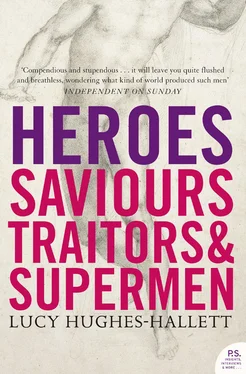Warfare provided an outlet for his prodigious energies. In civilian life, they festered. Cornelius Nepos praises his accomplishments and abilities but goes on: ‘ but yet, so soonas he relaxed his efforts and there was nothing that called for mental exertion, he gave himself again to extravagance, indifference, licentiousness, depravity’. He had voracious appetites, for sex, for drink, for luxury of all kinds, and he had the money to indulge them all. Already very rich himself, he married Hipparete, one of the wealthiest heiresses in Athens. The wedding seems to have scarcely interrupted his scandalous series of liaisons with courtesans. Scurrilous gossip later accused him of incest with his sister, mother, and illegitimate daughter. The charges are lurid and unconvincing (there is no other evidence that he even had a sister), but his reputation for promiscuity was undoubtedly well founded.
He was a high-handed swaggerer, someone by whom others were readily intimidated and who took pleasure in trying his power. He was jealous. Even Socrates said of him, albeit teasingly, ‘ I am really quite scaredby his mad behaviour and the intensity of his affections.’ He was violent. As a boy he had beaten up a teacher who confessed to owning no copy of Homer’s works (an assault that was generally agreed – such was the mystique accorded the two epics – to redound to the perpetrator’s credit). He once struck his father-in-law simply for a wager. He thrashed a man who had dared to subsidize a chorus in competition with the one he himself had sponsored. He was rumoured to have killed a servant. When he wanted his house decorated with murals he abducted the distinguished painter Agatharchus, locked him up in the house until he had done the work, then sent him home with a cartload of gold. Annoyed by Anytus, one of the many older men who doted on him, he refused an invitation to dinner but then arrived at the party, late and visibly drunk, with a gang of slaves whom he ordered to seize half of the gold and silver vessels Anytus had laid out to impress his guests (only Athenaeus, of the several ancient writers to tell this story, softens it by mentioning that Alcibiades subsequently gave the valuable dishes to a needy hanger-on). When Hipparete, rendered desperate by her husband’s shameless infidelities, appeared before the magistrates to petition for a divorce, Alcibiades interrupted the proceedings, seized her, and carried her home through the marketplace, ‘ and not a souldared oppose him or take her from him’. Such delinquency in one so high placed and privileged was unnerving. It threatened to disrupt not only the lives of his immediate circle, but of the whole community that observed him, fascinated and fearful. Timon, the notorious misanthrope, once accosted Alcibiades in the street, shook him by the hand, and said: ‘ You are doing well, my boy! Go on like this and you will soon be big enough to ruin the lot of them.’
As befitted Pericles’ ward, he soon began to make his mark in the Assembly, displaying, according to the great Demosthenes himself, an ‘extraordinary power’ of oratory. Pericles had died in 429 BC. By 421 Alcibiades, though not yet thirty, was one of the two most influential men in the city. The other, Nicias, was in nearly every way his opposite. Older than his rival by twenty years, Nicias was cautious, timid, and notoriously superstitious. Alcibiades’ indiscretions were brazen; Nicias used to shut himself up in his house at night rather than waste time or risk being duped by a spy. Alcibiades liked to dazzle the public; Nicias was careful to ascribe his success to the favour of the gods in order to avoid provoking envy. Most importantly, Alcibiades saw the by now protracted war against the Spartans as a splendid opportunity for the aggrandisement of himself and of his city; Nicias longed only to end it.
In 421 BC he succeeded temporarily in doing so. He negotiated a treaty whereby the Peloponnesians and the Athenians agreed to exchange prisoners and to restore all of each other’s captured territory. But, as Plutarch records, ‘ No soonerhad [Nicias] set his country’s affairs on the path of safety than the force of Alcibiades’ ambition bore down upon him like a torrent, and all was swept back into the tumult of war.’ There were disputes about the procedure for restoring the conquered cities and fortresses, disputes that Alcibiades aggravated and exploited. A Spartan delegation arrived in Athens. Alcibiades tricked them and undermined their standing, ensuring that the Assembly would refuse to deal with them and sending them home humiliated and enraged. Nicias followed after them but was unable to repair the damage: the Spartans rejected his overtures, the Athenians had lost their enthusiasm for the peace. Alcibiades was elected general (for one year, as was the custom). He forged an alliance with Mantinea, Elis, and Argos, and took Athens back to war.
There were those who accused him of making war for personal gain. Certainly there were prizes to be won which he would have welcomed. He had a reputation for financial rapacity. His father-in-law (or brother-in-law, accounts differ) was so afraid of him that he entrusted his enormous fortune to the state, lest Alcibiades might be tempted to kill him for it. He had already, after demanding a dowry of unprecedented size, extorted a second equally enormous sum from his wife’s family on the birth of their first child. His wealth was immense, but so was his expenditure. ‘ His enthusiasmfor horse breeding and other extravagances went beyond what his fortune could supply,’ wrote Thucydides. Besides, in the Athenian democracy (as in several of the modern democracies for which Athens is a model), only the very rich could aspire to the highest power. Alcibiades needed money to pay for choruses, for largesse, for personal display designed, not solely to gratify his personal vanity, but to advertise his status as a great man.
But the war offered him far more than money. It provided him with a task hard and exhilarating enough to channel even his fantastic vitality, and it afforded an opportunity for him to satisfy the driving ambition Socrates had seen in him. Nicias, his rival, understood him well, and paid back-handed tribute to his eagerness for glory when he told the Athenian Assembly to ‘ Beware of [Alcibiades]and do not give him the chance of endangering the state in order to live a brilliant life of his own.’
As advocate for the war, Alcibiades was spokesman for the young and restless, and also for the lower classes. He probably belonged to one of the clubs of wealthy young Athenians, clubs that were generally (and correctly) suspected to be breeding-places of oligarchic conspiracy, but there is no evidence he had any such sympathies. Haughty and spectacularly over-privileged as he was, his political affiliations were democratic. In his personal life he defied class divisions. Homer’s lordly Achilles detests the insolent commoner Thersites, and in an extra-Homeric version of the tale of Troy he kills him, thus upholding the dignity of the warrior caste and silencing the mockery of the people. Alcibiades would not have done so. He earned the disapproval of his peers by consorting with actors and courtesans and other riffraff, and he was to remain friends for most of his life with Antiochus, the common seaman who caught his quail. Politically, he followed the example of his guardian Pericles in establishing his power base among the poorer people, who tended to favour war (which was expensive for the upper classes, who were obliged to pay for men and ships, but which offered employment, decent pay, and a chance of booty to the masses). According to Diodorus Siculus, it was the youthful Alcibiades who urged Periclesto embroil Athens in the Peloponnesian War as a way of enhancing his own standing and diverting popular attention from his misdemeanours. Certainly Alcibiades would have learnt from observing his guardian’s career that, as Diodorus puts it, ‘ in time of warthe populace has respect for noble men because of their urgent need of them … whereas in time of peace they keep bringing false accusations against the very same men, because they have nothing to do and are envious’.
Читать дальше












